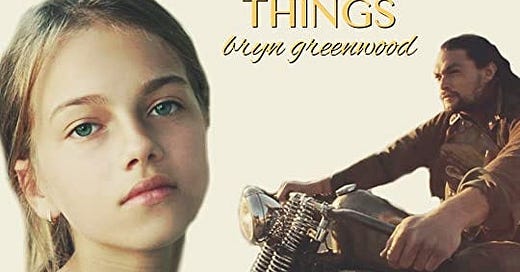Note: Famed for its twice weekly posts (one writing tip; one publishing or promotional tip) An Alle Alert! is adding a weekly thought about surviving trauma, for survivors and for those who love and/or care about them
In the novel, All the Ugly and Wonderful Things, author Bryn Greenwood sets out to show the development and ultimate connubial bliss of the (generously, we shall call it for now) relationship between a grade-school girl, Wavy, and the eighteen-year-old drug-runner Kellen — all set on a meth-making compound in the rural Midwest.
Ugly/Wonderful attempts to portray a pedophile in such a way that we can see how he would make his ultimate choice.
Why a person needs this understanding is anybody’s guess.
However, writers write about what they write about. Still, I am flabbergasted that Greenwood would use Ugly/Wonderful to put forth a patently delusional idea: Wavy and Kellen’s is a true love.
Yep, that’s what pedophiles say.
Now, I’ve experienced enough healing around the long-term abuse in my childhood that while I wouldn’t invite a pedophile to dinner, and I’d happily throw an ax at an active one, I no longer always react out of my history. However: real love between a pedophile and victim? That is just not how pedophilia works.
By and large, adults — even young adults — who are sexually attracted to children lose interest as the child grows up; unless they also suffer from ephebophilia (sexual attraction to teens). Of additional psychological inaccuracy: Kellen uses adult porn. He doesn’t hang around kids. He shows none of the patterns standard to pedophilia except that he has no friends his age and that he was bullied as a child.
It could be that Greenwood is attempting to show us a pedophile in his first cycle of grooming and raping. It is highly doubtful that a pedophile would reach the age of eighteen with no acting out whatsoever.
But see, to try to let us into the mind of Kellen as a real pedophile would ruin Greenwood’s strange, great hope: theirs is a true love. Some basic rules about life beg to differ:
Adults should not be sexual with children.
There is no consent. Wavy’s psycho-social and emotional development stops somewhere between the instant Kellen begins grooming her and the time he first rapes her. In effect, she is still a child.
As there is no consent, there is no “relationship.” There may be a great deal of feeling, of yearning, but neither is love. There is no love. There is only abuse.
The novel makes the argument (as do readers and—for God’s sake!—professional reviewers) that Wavy is mature for her age. Yep, that’s what pedophiles say.
Despite basic problems with understanding her subject matter, Greenwood’s writing can be lovely. She is deft in portraying Wavy. With parents possessing the caring ability of a feckless goldfish, Wavy is precisely as dreamy about Kellen as you would imagine a neglected and abused girl-to-teen-to-young adult would be. Under Greenwood’s smooth pen, we can’t judge Wavy for her poor choices, her idealism. She is a child trying as best she can. And doing remarkably well, despite Kellen, her parents, and her environment.
Greenwood allows Kellen a great deal of (here’s that word again; tongue goes into cheek) feeling around his attraction to and then rape of a child. However, who gives a bowl of soggy cereal about the internal turmoil of an active pedophile? Greenwood’s attempt to understand it is as misguided as it is unbelievable.
The one thing the novel does accomplish, however, is to give pedophiles a banner to wave.



